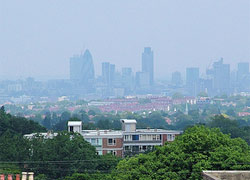
School children in east London are to be the subject of a new study into the effect of air pollution and lack of sunlight on asthma levels.
The research will try to determine if children who get less vitamin D - absorbed via sunshine - are more likely to suffer from respiratory illnesses.
Researchers said they will also monitor how close schools sit to sources of air pollution, such as busy roads.
The study is being funded by a £1.2m grant from a major research group.
The funding, from the National Institute for Health Research's partners at Guy's and St Thomas' and King's College London, will allow scientists to work with children in Tower Hamlets.
Professor Tak Lee, of King's College, who is leading the study, said: "This project is hugely important for our local population. London has one of the worst traffic pollution problems in Europe and local children almost certainly have very high rates of vitamin D deficiency.
"I am confident that this study will lead to real advances in the understanding of asthma and the clinical care we can deliver to our patients."
Inflamed airways
Mr Lee said 90% of the British population has insufficient vitamin D during the winter months - a rate that is even higher in east London, especially among ethnic minorities.
In east London, more than 18% of children have being diagnosed with asthma, the researcher said.
Mayor Boris Johnson recently angered environmental and health campaigners when he cancelled a planned third phase of London's Low Emission Zone (LEZ) which fines users of carbon-emitting heavier vehicles.
Data collected from children in Tower Hamlets who go to school near busy main roads will be compared with data collected before the LEZ was first introduced in January 2008.
In addition to air pollution monitoring, they will study how low vitamin D levels aggravate inflamed airways.
Dr Elaine Vickers, of Asthma UK, said: "As the UK has one of the highest rates of childhood asthma in the world, with over a million children currently receiving treatment, this could have major implications for government environmental policies in the future."
Source: BBC News


